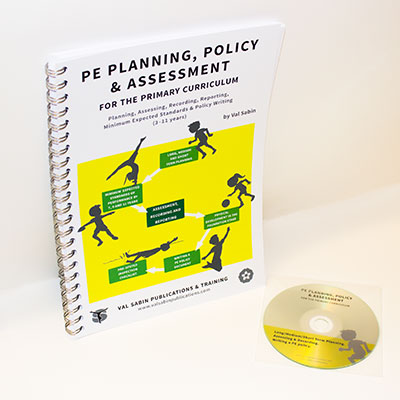Val Sabin PE Planning, Policy & Assessment:

This “Policy into Practice” manual contains a unique collection of Physical Education standards, systems and guidelines for primary schools (3 – 11 years) designed to propel the P.E.
Co-ordinator quickly through the administration process, saving large amounts of time, whilst setting high quality standards for the school in the policy, procedures and objectives.
PE Planning Sample Pages
Introduction to PE Planning, policy & Assessment
PE Planning, Policy & Assessment (in the Primary Curriculum) contains long, medium and short term planning. It contains the minimum expected standards of performance by 7, 8 and 11 years, includes assessment, recording and reporting. Physical development in the foundation stage, how to write a PE policy document and contains a pre-Ofsted inspection checklist.
The section on curriculum planning identifies the seven stages involved in long-term, medium-term and short-term planning. “Master’ grids are included for long-term mapping and identification of activities.
This ensures breadth and balance of experiences and fulfills National Curriculum requirements. Examples of medium-term planners are given which encourage structured planning of a unit of work and ideas for lesson structure are offered for short-term planning.
Knowing what most children should be able to achieve at different ages encourages shared expectations, co-ordinated planning and helps to ensure continuity.
Minimum Expected Standards
“Minimum Expected Standards” provides an extensive and very detailed record of what the majority of pupils can achieve in each area of activity by the ages of 7 years, 9 years and 11 years.
The standards are linked to the appropriate Attainment level for the age group and are reflected in the general statement of attainment for each Key Stage identified in the National Curriculum (2014).
Assessment
Assessment is an integral part of the planning process and “why” “what” and “how” to assess are addressed in some detail. A “master” sheet is also included which encourages the communication of assessment criteria to pupils at the beginning of a unit of work.
The questions of “Why record?” and “How much do we record?” are addressed and five different recording systems are outlined with accompanying “master’ sheets or grids. Any one of these systems could be used as presented, or adapted to suit the particular needs of the school and enable accurate and meaningful reporting.
Foundation Stage
Foundation Stage children need many opportunities to learn and develop through engaging in a curriculum offering both structured play planned and guided by the teacher and activities initiated by the children.
The Early Years Foundation Stage guidance in this manual breaks the Early Learning Goals for Physical Development down into more specific expectations, then details the learning objectives through which they can progress to reach the expectations. Possible teaching strategies are also identified.
Policy Writing
Policy writing is a fundamental part of management and should describe the practice of the PE department. Primary school co-ordinators are led through a step-by-step guide to writing a policy.
Finally, to help schools prepare for an OFSTED inspection, a brief pre-inspection checklist is included.
An accompanying CD ROM contains all “master” sheets for planning and assessment plus a detailed template of the PE Policy document.
Price
£40.00 (Paperback)
Please contact us to place your order.

